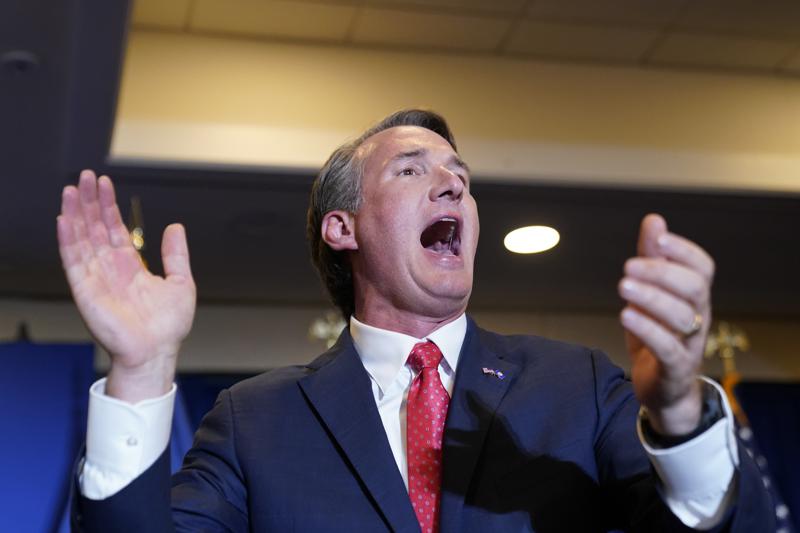
RICHMOND, Va. – After Glenn Youngkin’s stunning victory in the Virginia governor’s race — a state President Joe Biden won last year by 10 percentage points — and a strong GOP showing in deep-blue New Jersey’s, party leaders believe they have a model that can deliver them big wins in next year’s midterm elections.
By tapping into culture war fights over issues like school curricula, the GOP can energize Trump’s loyal base. But party leaders believe this week’s results demonstrate they can also win back suburbanites who abandoned the GOP during the Trump era by talking about local issues like taxes and keeping the former president at arm’s length.
“Clearly Youngkin’s win was a boost to Republicans and gives us momentum going into next year,” said Asa Hutchinson, the Republican governor of Arkansas, who has not ruled out a run for president in 2024. That, combined with the surprisingly competitive race for governor in New Jersey, “showed that a Republican in this environment, talking about state issues, talking about education, talking about the future, can even win suburban votes and can win the middle.”
As the full extent of Tuesday’s voting became clear, the National Republican Congressional Committee, which is focused on retaking control of the House, named 13 more Democratic seats it hoped to flip. The National Republican Senatorial Committee, meanwhile, noted next year’s map is weighted heavily toward swing states like Pennsylvania, Arizona and Georgia, which Biden won by far slimmer margins than he won Virginia and New Jersey.
Other states where Democrats have eyed Senate seats, such as North Carolina and Florida, were carried by Trump in 2020.
“It completely changes the dynamics of the map,” NRSC spokesman Chris Hartline said.
The results emboldened some Trump critics like Maryland Gov. Larry Hogan, a Republican who swept his own blue state and has long stressed the party’s need to win back the swing voters and moderates whom Trump alienated.
”That’s the way we’re going to win,” Hogan said. “It’s a great road map. You can’t double down on failure,” he said, arguing that voters “want to hear what you’ll do for them, not for Trump.”
Of course, it remains unclear heading into the midterms whether Republicans will nominate the kind of candidates with the same appeal as Youngkin.
Many GOP primary contests, from Ohio to North Carolina, have been dominated by contenders who have tried to out-Trump one another.
Trump endorsed Youngkin and praised him in the race’s final stretch, but his involvement in the campaign was limited, including holding a “tele-rally” on election eve in which he spoke for less than 10 minutes.
Democratic candidate Terry McAuliffe, meanwhile, flooded the airwaves with ads portraying Youngkin as a Trump acolyte, reminding Republicans that he was one of them.
Youngkin tapped into an issue set that appealed both to rural voters in deeply Republican swaths of southwestern Virginia as well as those in the suburbs who agreed with Trump on the economy and other kitchen table issues but were turned off by his tone. He presented himself in chipper campaign ads as a genial, suburban dad in a sweater vest who could appeal to parents.
In particular, he seized on frustrations of parents, many of whom grew incensed over their children’s schools’ refusal to resume in-person classes during the pandemic, and subsequent mask mandates and attendance policies.
But as he promised to increase teacher pay and school budgets, Youngkin also didn’t shy away from the culture war issues that Trump heralded in an effort to portray Democrats as out of the mainstream.
Youngkin sounded the alarm over transgender rights and critical race theory, an academic framework that centers on the idea that racism is systemic in the nation’s institutions and that they function to maintain the dominance of white people.